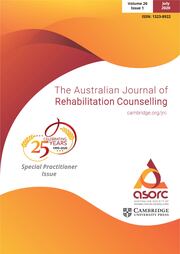Article contents
Qualitative Methods in Rehabilitation Research and their Relevance to Rehabilitation Counselling Practice
Published online by Cambridge University Press: 27 August 2015
Abstract
This paper discusses the potential limitations, and barriers to acceptance, of qualitative research methodologies. Qualitative research has been dismissed for consisting of small unrepresentative samples that limit the generalisability of findings, for lacking reliability and validity, for providing analyses that mask the individual differences that it purports to highlight, and for being too subjective. It was argued that these criticisms have to be considered against a different set of criteria to those applied to quantitative research. Moreover, the rationale behind qualitative research can provide rehabilitation counsellors with a better understanding of living with disability. This paper seeks to encourage rehabilitation counsellors to (a) gain insight into the different perspectives of persons with disabilities; (b) develop their clinical or knowledge base; and (c) be self-reflexive and critically self-examine their interaction with clients.
- Type
- Articles
- Information
- Copyright
- Copyright © Cambridge University Press 2000
References
- 3
- Cited by


